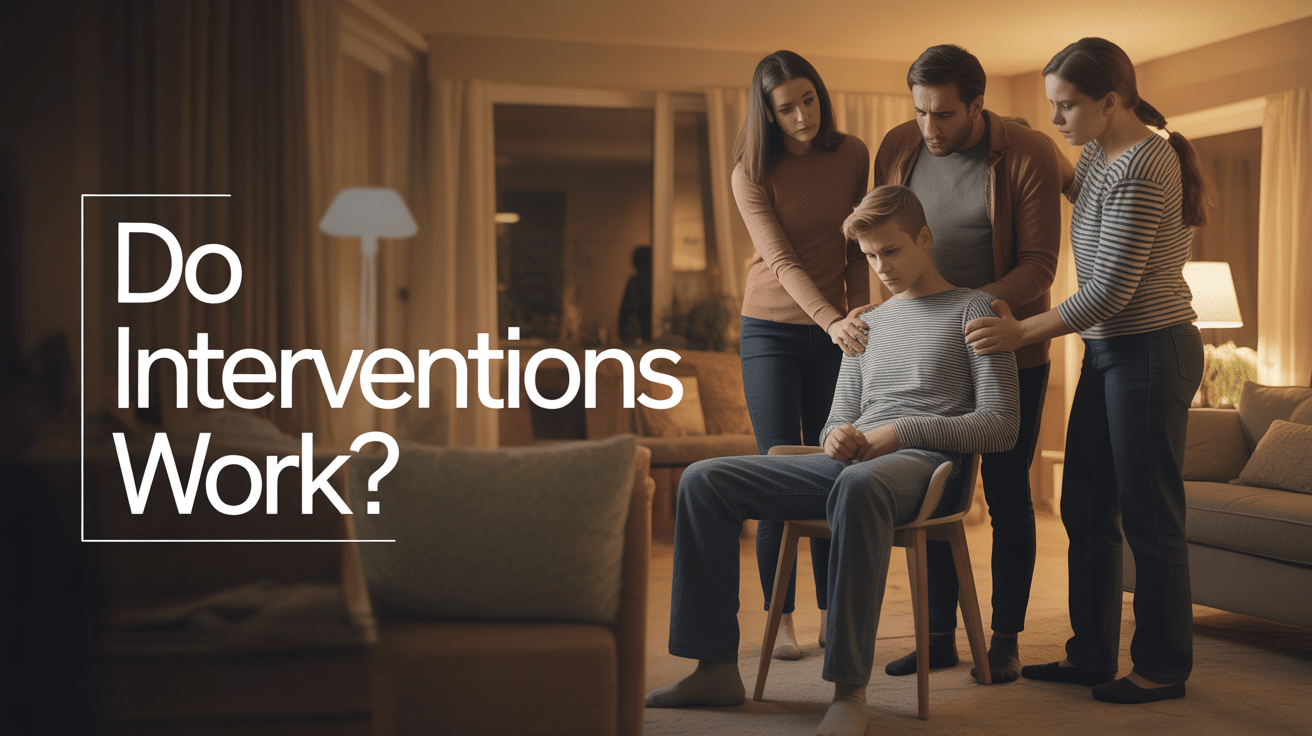Do Interventions Work?
Introduction
When someone struggles with addiction, substance abuse, or severe mental health challenges, families often wonder: do interventions work? The concept of an intervention is widely recognized in psychology and psychiatry as a structured way to confront destructive behavior and encourage someone to seek treatment. But success is not guaranteed, and outcomes vary based on preparation, timing, professional support, and the individual’s willingness to change.
This blog explores whether interventions work, what makes them effective, the role of professional interventionists, and how therapy, medication, and community support can reinforce long-term recovery.

What Is an Intervention?
An intervention is a planned conversation where family, friends, or a professional interventionist confront a person about their addiction, substance use, or destructive behavior. The goal is not to shame or punish but to create a moment of clarity that motivates them to seek treatment.
Interventions are used in cases involving alcohol abuse, opioid dependency, drug addiction, and even situations linked to major depressive disorder, violence, or unmanaged anger. They can also be part of broader crisis intervention strategies in mental health care.
Do Interventions Work? Research and Evidence
The question “do interventions work” has been studied extensively in psychology, psychiatry, and social work. Research shows that well-planned addiction interventions increase the likelihood that someone will seek treatment compared to families waiting for the person to reach “rock bottom.”
However, success rates vary. Some studies suggest that professional interventionist-led programs result in 80–90% of participants entering treatment. Others show mixed results, particularly if the person denies having a problem or feels overwhelmed by shame and anger.
Effectiveness often depends on:
- The presence of a trained mental health professional
- Clear communication of concern and love rather than judgment
- The availability of immediate treatment options such as therapy, detox, or medication
- The willingness of the individual to recognize addiction as a disease rather than a personal failure
How Addiction Interventions Can Help
Addiction interventions help families and communities break through cycles of denial and avoidance. For many, substance abuse and destructive behavior have become normalized over time, making it difficult to address the issue directly. An intervention provides structure, clarity, and urgency, giving families a way to confront the problem with compassion rather than hostility. By doing so, it shifts the focus away from shame and blame toward a constructive solution that centers on treatment.
In addition to addressing addiction directly, interventions can also improve family relationships. They offer a safe space for loved ones to express how addiction has affected them while setting clear boundaries. When guided by a professional interventionist, the process becomes an opportunity not just to push someone into therapy but to rebuild trust, strengthen communication, and establish long-term goals for recovery.
Signs That Someone Needs an Intervention
Recognizing the right time to stage an intervention is critical. Warning signs may include escalating substance abuse, frequent blackouts, dramatic mood changes, or an inability to maintain responsibilities at work or home. Other indicators may involve violence, repeated legal issues, or patterns of reckless behavior that put both the individual and others at risk.
Beyond outward behavior, there are subtler signs. A person may withdraw from their community, lose interest in once-meaningful activities, or show symptoms of major depressive disorder. Loved ones may notice a cycle of relapse, shame, and denial that never resolves. When these patterns appear, it is often a signal that professional support, including a formal intervention, is urgently needed.

Why People Resist Interventions
Resistance is common. People struggling with substance abuse or mental health disorders may feel attacked or judged. Feelings of shame can lead to anger, denial, or even violence in some cases.
Psychology explains this through defense mechanisms—denial, minimization, or rationalization—that protect the person from facing the pain of addiction. A major depressive disorder or co-occurring anxiety disorder may further complicate their ability to accept help.
This is why interventions are rarely successful when attempted without preparation or professional support.
The Role of a Professional Interventionist
A professional interventionist is a trained expert who facilitates the process. Their role includes:
- Educating families about addiction, psychology, and relapse risks
- Designing a structured intervention plan with clear goals
- Mediating conversations to prevent escalation into anger or conflict
- Coordinating with treatment centers, insurance providers, and mental health professionals
- Ensuring immediate transfer into therapy, detox, or rehab if the person agrees
Families who attempt interventions without guidance often struggle to remain calm. An interventionist’s experience helps avoid emotional explosions that might drive the individual further away.
Types of Interventions
Not all interventions look the same. Several approaches are used in addiction interventions and crisis intervention programs:
- Direct Interventions – A family and interventionist confront the person in a structured meeting.
- Indirect Interventions – Support is provided to family members, helping them change their own behavior to influence the person.
- Crisis Intervention – Used in emergencies involving violence, drug overdose, or psychiatric breakdowns. Mental health professionals or law enforcement may be involved.
- ARISE Model – A collaborative approach that includes the individual from the beginning rather than surprising them.
Interventions and Addiction Treatment
An intervention is only the beginning. Its goal is to guide someone into treatment, which may include:
- Therapy: Individual, group, or family sessions help address emotional triggers, trauma, and unhealthy behavior patterns.
- Medication: For opioid use disorder, medications like methadone, buprenorphine, or naltrexone can reduce cravings and withdrawal. For major depressive disorder or other mental health conditions, antidepressants may be prescribed.
- Psychiatry and Psychology Services: Comprehensive evaluation ensures co-occurring disorders are treated alongside addiction.
- Social Work and Community Support: Connecting individuals to resources, education, and community support groups builds long-term resilience.
Without follow-up care, relapse is likely. Research highlights that relapse is not a failure but part of the recovery process, making ongoing therapy and support essential.
The Risks of Interventions
While interventions can save lives, they also carry risks:
- The person may feel betrayed, especially if blindsided.
- Anger and shame can fracture family relationships.
- Violence may occur if emotions escalate.
- Without immediate treatment, the momentum gained during the intervention is lost.
Because of these risks, it is highly recommended that families seek help from a professional interventionist.

Cost, Insurance, and Accessibility
One barrier families face is cost. Professional interventions and subsequent treatment can be expensive. Insurance may cover therapy, detox, or rehab but not always the intervention process itself.
Families should review their insurance plans carefully and consult with a mental health professional or treatment center about coverage. Some community programs and nonprofits provide financial assistance, ensuring that those in need can still access services.
Addiction, Mental Health, and the Bigger Picture
Addiction is not simply a matter of poor choices—it is a disease with biological, psychological, and social components. Substance abuse alters brain chemistry, while trauma, stress, and genetics contribute to vulnerability.
Psychology and psychiatry agree that interventions are most effective when they treat the whole person, addressing not only the addiction but also underlying issues such as major depressive disorder, anger management, and unresolved trauma.
Community involvement, education, and social work are crucial in building sustainable recovery. Prevention programs in schools, public health campaigns about alcohol and drug abuse, and education about mental health reduce stigma and encourage early help-seeking.
Do Interventions Work? A Balanced Answer
So, do interventions work? The answer is: yes, when done correctly. They are not magic solutions, but they create a critical window of opportunity. When guided by a professional interventionist, backed by therapy and psychiatry, supported by family and community, and followed by immediate treatment, interventions can break cycles of addiction and abuse.
But interventions also fail when:
- Families act without guidance
- The person is unprepared for change
- Treatment options are not immediately available
- Anger and shame overshadow love and concern
Ultimately, interventions are not a one-time fix. They are a starting point in a lifelong process of healing, recovery, and resilience.
Conclusion
Addiction interventions are powerful tools when combined with therapy, medication, community support, and ongoing care. They can reduce substance abuse, improve mental health, and prevent relapse. They also bring families closer together by replacing denial and chaos with hope and action.
If you are considering an intervention, consult a professional interventionist or mental health professional. With preparation, compassion, and follow-through, an intervention can be the turning point that saves a life.
FAQs
1. Can interventions help with mental health issues that aren’t addiction-related? Yes, interventions can address behaviors linked to mental health conditions such as major depressive disorder or unmanaged anger, particularly when safety is at risk.
2. How do families prepare for an intervention? Preparation involves consulting a professional, rehearsing communication, arranging treatment in advance, and ensuring insurance coverage or financial planning.
3. Are there cultural differences in how interventions are done? Yes, cultural values influence how families approach addiction and mental health. Some communities prefer collaborative, family-driven interventions, while others lean on professional support.
4. What role does aftercare play in preventing relapse after an intervention? Aftercare—including therapy, medication management, and community support—is critical. Without it, relapse risk increases significantly.

